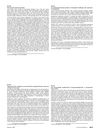 January 2021 in “Case Reports”
January 2021 in “Case Reports” A 71-year-old woman developed male-like features due to high testosterone levels caused by a benign ovarian tumor, which was successfully removed by surgery.
 37 citations,
October 2006 in “Steroids”
37 citations,
October 2006 in “Steroids” New sulfur-containing steroid analogs show promise for more targeted medical treatments.
 28 citations,
May 1986 in “Clinics in endocrinology and metabolism”
28 citations,
May 1986 in “Clinics in endocrinology and metabolism” New compounds may soon be tested to treat excessive hair growth in women.
 41 citations,
March 2007 in “Steroids”
41 citations,
March 2007 in “Steroids” New methods to make oxasteroids show promise for medical treatments like osteoporosis and breast cancer.

Surgery can be a safe and effective option for infertile women with PCOS who don't respond to medication and want to get pregnant.
 October 2023 in “Dermatology practical & conceptual”
October 2023 in “Dermatology practical & conceptual” Finger length ratios might help predict common hair loss.
 4 citations,
April 2016 in “Journal of Dermatology Research and Therapy”
4 citations,
April 2016 in “Journal of Dermatology Research and Therapy” Anti-androgens are safe and effective for treating moderate to severe adult female acne.
 125 citations,
August 2020 in “Frontiers in Immunology”
125 citations,
August 2020 in “Frontiers in Immunology” Men generally have more severe COVID-19 cases and higher death rates than women due to biological differences.
 1 citations,
November 2021 in “Biomedicines”
1 citations,
November 2021 in “Biomedicines” Understanding how acne develops in different diseases could lead to new treatments.
 December 2023 in “Expert Review of Endocrinology & Metabolism”
December 2023 in “Expert Review of Endocrinology & Metabolism” New methods help diagnose skin conditions caused by too much male hormone in women, like acne, hair loss, and excess hair growth.
 7 citations,
January 2011 in “Journal of The American Academy of Dermatology”
7 citations,
January 2011 in “Journal of The American Academy of Dermatology” Most women with hyperandrogenism first show acne, and skin conditions like hirsutism and acanthosis nigricans are good indicators of the condition.
January 1990 in “Journal of dermatological treatment” Clinical features of hyperandrogenism do not predict the success of conventional acne treatment in women.

Polycystic ovary syndrome (PCOS) affects about 10% of women, is often linked to obesity and family history, and can cause irregular periods, fertility issues, and other symptoms. It's usually managed with lifestyle changes, weight loss, and medication.
 5 citations,
September 2021 in “Cureus”
5 citations,
September 2021 in “Cureus” Depression in women with Polycystic Ovarian Syndrome (PCOS) is linked to insulin resistance and hyperandrogenism, and managing these can help reduce depression. Lifestyle changes and Cognitive Behavioral Therapy can be effective treatments.
 4 citations,
June 2019 in “Revista brasileira de ginecologia e obstetrícia”
4 citations,
June 2019 in “Revista brasileira de ginecologia e obstetrícia” Using only hyperandrogenism to diagnose PCOS can lead to overdiagnosis.
 December 2022 in “International Journal of Health Science”
December 2022 in “International Journal of Health Science” High levels of male hormones in women with PCOS can lead to fertility issues and symptoms like irregular periods, hair growth, acne, and hair loss; lifestyle changes are recommended for management.
January 2021 in “Voprosy ginekologii akušerstva i perinatologii” Effective management of hyperandrogenism in young women requires accurate diagnosis and tailored treatment.
 12 citations,
March 2022 in “Frontiers in Nutrition”
12 citations,
March 2022 in “Frontiers in Nutrition” Obesity is linked to various skin conditions and issues, and losing weight can improve these conditions.
 October 2017 in “Journal of medical science and clinical research”
October 2017 in “Journal of medical science and clinical research” Obese people are more likely to have certain skin conditions like dark patches, stretch marks, skin tags, and bumpy skin.
 61 citations,
February 2001 in “American Journal of Obstetrics and Gynecology”
61 citations,
February 2001 in “American Journal of Obstetrics and Gynecology” Metabolic syndrome and PCOS are related but separate conditions, with metabolic syndrome increasing the risk of heart disease and diabetes.
 36 citations,
November 2018 in “American Journal of Clinical Dermatology”
36 citations,
November 2018 in “American Journal of Clinical Dermatology” Alopecia is linked to various health and mental conditions, impacts life quality, and needs medical attention beyond its cosmetic effects.
 January 1993 in “Проблемы Эндокринологии”
January 1993 in “Проблемы Эндокринологии” Spironolactone effectively reduces symptoms of hyperandrogenism but has some side effects.
 32 citations,
January 2007 in “KARGER eBooks”
32 citations,
January 2007 in “KARGER eBooks” Severe insulin resistance can be managed with medication, lifestyle changes, and treatment for related conditions.
 31 citations,
January 2018 in “Pediatric annals”
31 citations,
January 2018 in “Pediatric annals” Early adrenal gland maturation in young children can be normal, but other serious conditions should be ruled out first.

The conclusion is that there's a link between high testosterone levels, insulin resistance, and certain skin conditions, regardless of obesity.

Hair loss in women can be caused by genetics, menopause, certain health conditions, and emotional stress, and it often results in thinner hair and a changing hairline.

Proper medical treatments can control and even reverse female pattern hair loss, but it's important to check for related conditions like excessive male hormone production, especially in severe cases.
39 citations,
November 1990 in “The Journal of Steroid Biochemistry and Molecular Biology” Antiandrogens help treat hormone-related conditions in both men and women.
 1 citations,
October 2017 in “Elsevier eBooks”
1 citations,
October 2017 in “Elsevier eBooks” Antiandrogens can treat female hormonal conditions, but environmental ones may harm reproductive health.
 128 citations,
September 2011 in “British Journal of Dermatology”
128 citations,
September 2011 in “British Journal of Dermatology” Obesity is linked to various skin problems and may increase the risk of skin cancer.



























